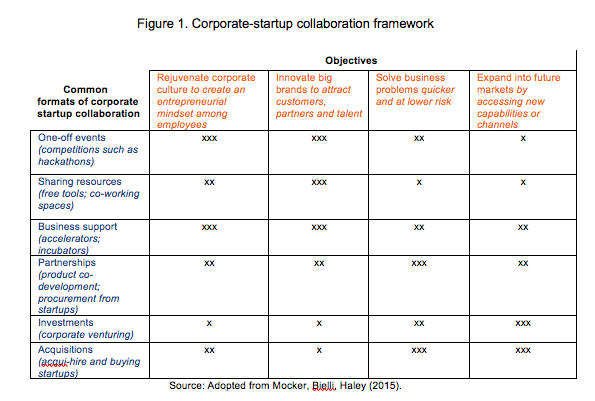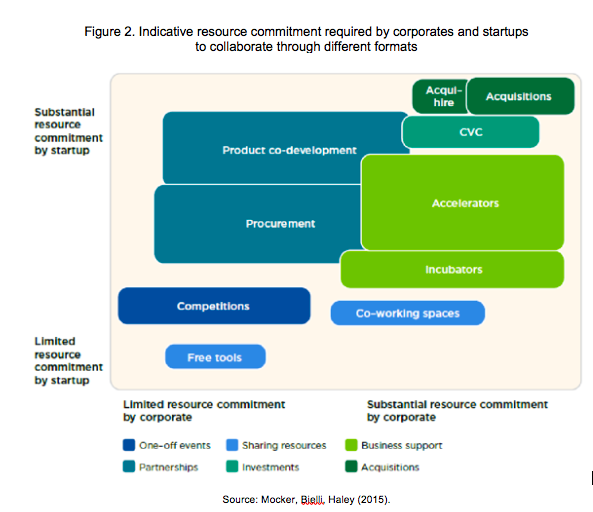Both in the literature and in practice different models and formats of collaboration exist.
Corporates make choices on how to engage with startups successfully depending on various criteria. For instance, Weiblen and Chesbrough (2015) distinguished between:
- traditional models of engaging with startups: influence through equity (e.g. Corporate Venture Capital, Corporate Incubation) and
- new models of engaging with startups: influence through technology and market access (e.g. Outside-In Startup programs, Inside-out platform startup programs.
This typology reflects the two well-established formats, namely corporate venture capital and internal incubators. However, the growing profitability of startup companies and the accompanying disruptions create a new imperative to develop more agile and quicker ways to get involved with the startup community. Working with startups has proved to be a great way for many companies to meet new market challenges.
Corporate entrepreneurship practice is an effect of multiple drivers, anticipated collaboration outcomes, and resource commitment. Hence the effective collaboration with startups should start with a definition of goals and anticipated returns. In general, the following goals can be typically identified (Mocker, Bielli, Haley, 2015):
- Rejuvenating corporate culture – Working with startups helps create an entrepreneurial mindset among employees who are exposed to agile teams, a lean approach, and fresh thinking. Startups also help corporations to become aware of future trends and the potential of new technologies.
- Innovating big brands – Working with startups not only rejuvenates corporate thinking but also modifies the perception of corporate brands by customers, partners, and future employees.
- Solving business problems – Developing new innovative solutions and products using startups instead of internally is often much faster and less risky for your core business. Startups bring new technologies, business models, and talent to the market.
- Expanding into future markets – Startups can be an important channel for expanding business operations to new markets. Young companies also usually have the necessary skills and agility to compete in emerging sectors.
Depending on these goals, corporate-startup collaboration may take different formats. In practice, many corporations are gradually building a portfolio of programs and combining or adapting various elements to achieve multiple parallel goals. The most common programmes types to engage with startups can be summarized in Figure 1. This framework indicates which programmes tend to be most suitable to achieve the four key objectives. The “xxx” means stronger suitability to satisfy multiple objectives, and “x” a weaker one.

Corporate-startup collaboration formats can be classified according to the level of resources needed. Each company, both medium and large, has resources that it can use to launch the startup program. Figure 2 provides a general overview of resource commitment depending on the type of program. Resources can include various things, such as cash (to pay for events, programme costs, investments, etc.), employee time (from the executive level to employees who make engagement decisions, provide mentoring in programmes and product feedback, or attend events), products (including technologies or services that are provided for free or at a reduced price through programmes) and intangible assets (specific strengths such as market access, customer networks).
These resources can be further utilized through external partnerships with other organizations (other corporates, accelerators, consultants, etc.). Importantly, programs that attract the best startups understand that resource requirements, and thus the “costs” of programs, may vary for corporations and startups. To meet certain objectives, different combinations of resources need to be deployed.

As you can see the choice of collaboration framework is a complex decision, which entails many variables. This choice breaks significant, often long term consequences for the corporation. This is why recently a growing number of organizations act as intermediaries, they specialize in helping corporations and startups identify and find matching partners. Cooperation with experienced organizations usually speeds up the launch of win-win programs and increases the likelihood of positive outcomes and specific returns for all parties involved.
References:
- Amit, R., & Zott, C. (2012). Creating Value Through Business Model Innovation. Mit Sloan Management Review, 53(3), 36-44. doi: http://marketing.mitsmr.com/PDF/STR0715-Top-10-Strategy.pdf#page=38
- Birkinshaw, J., Bessant, J., & Delbridge, R. (2007). Finding, forming, and performing: Creating networks for discontinuous innovation. California Management Review, 49(3), 67-+. doi:10.2307/41166395
- Chesbrough, H., & Crowther, A. (2006). Beyond high tech: early adopters of open innovation in other industries. R & D Management, 36(3), 229-236. doi:10.1111/j.1467-9310.2006.00428.x
- Kohler, T. (2016). Corporate accelerators: Building bridges between corporations and startups. Business Horizons, 59(3), 347-357.
- Mocker V., Bielli S., Haley C. (2015). Winning together: A guide to successful corporate-startup collaborations. London: Nesta
- WEF (2018). Collaboration between Start-ups and Corporates: A Practical Guide for Mutual Understanding. Geneva: World Economic Forum, http://www3.weforum.org/docs/WEF_White_Paper_Collaboration_between_Start-ups_and_Corporates.pdf
- Weiblen T., Chesbrough H.W. (2015). Engaging with Startups to Enhance Corporate Innovation. “California Management Review”, vol. 57(2), pp. 66-90.
- Zahra, S. A. (2015). Corporate entrepreneurship as knowledge creation and conversion: the role of entrepreneurial hubs. Small Business Economics, 44(4), 727-735.


